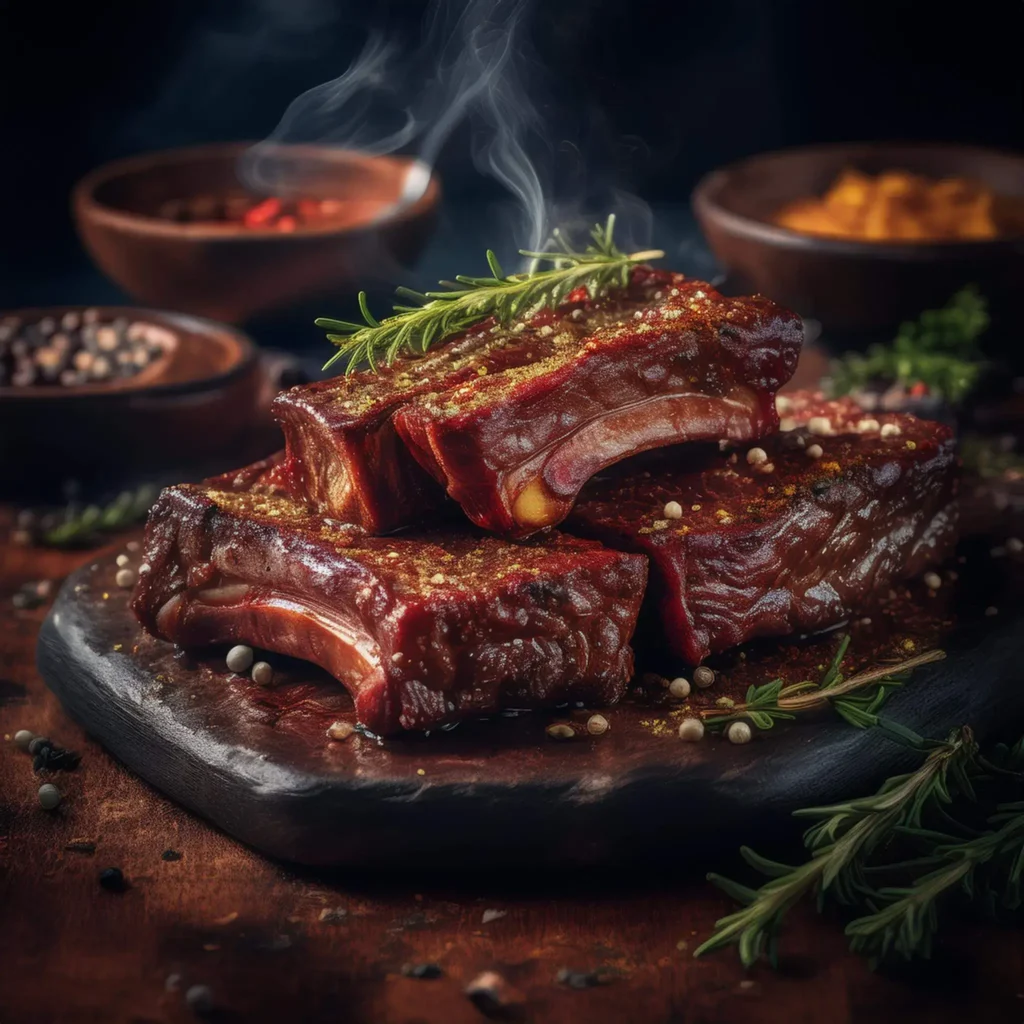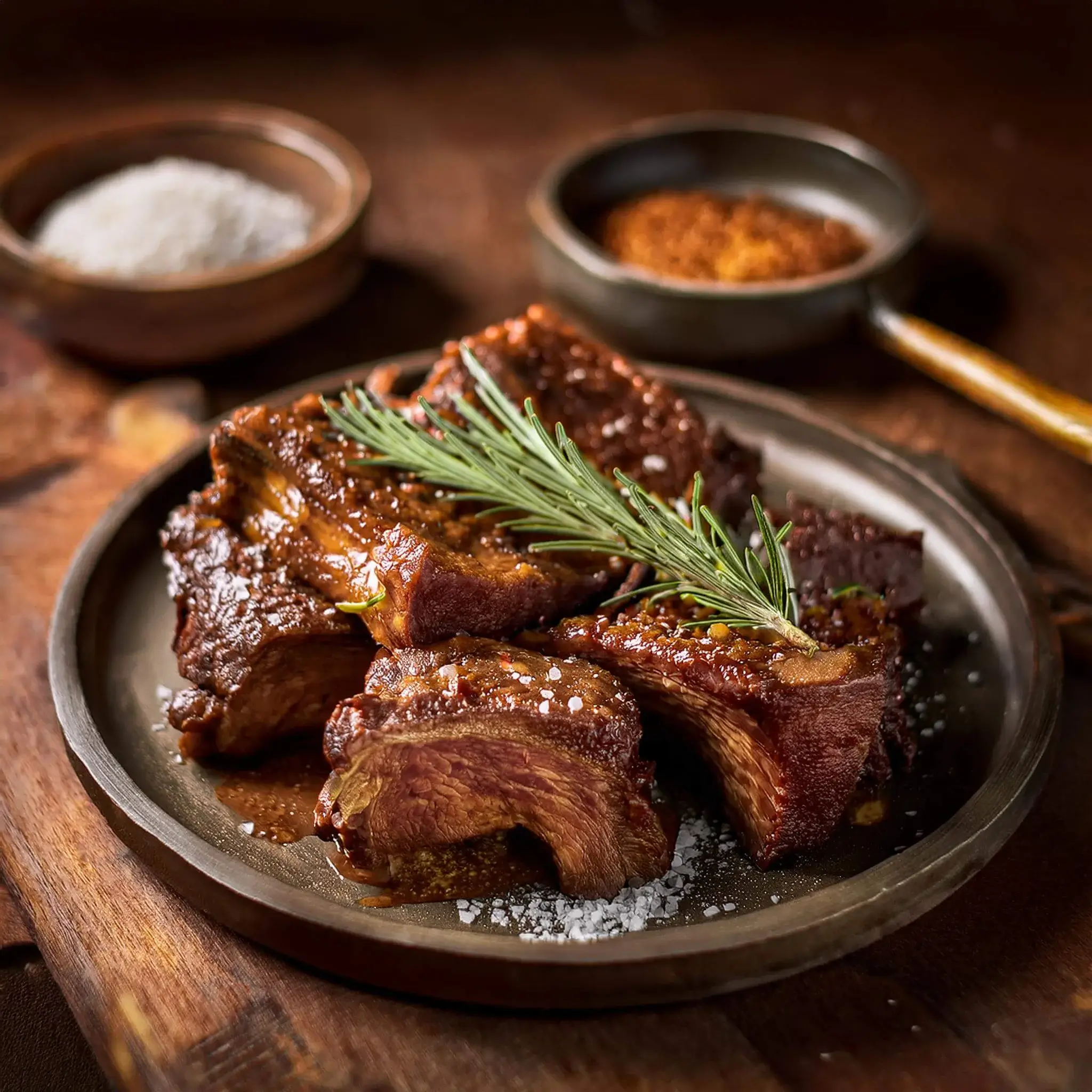Before we dive into the nitty-gritty of beef short ribs and their mouthwatering flavors, let’s set the stage. This article unpacks a sizzling culinary debate: Should I season beef short ribs the night before? From exploring the science behind seasoning to practical storage tips and common pitfalls, you’ll learn everything needed to make your short ribs irresistibly tender and flavorful. Let’s get started!
Should I Season Beef Short Ribs the Night Before?
When it comes to cooking beef short ribs, seasoning plays a pivotal role in bringing out their deep, savory essence. But timing your seasoning is the million-dollar question. Many chefs swear by seasoning overnight, arguing it allows flavors to penetrate deeply into the meat, while others find the method unnecessary or even risky.
Seasoning short ribs the night before is about more than just sprinkling spices and leaving them in the fridge. It’s a combination of choosing the right cuts, applying a balanced rub, and understanding how time enhances taste and texture. Whether you’re planning a slow-cooked masterpiece or a barbecue feast, understanding why and how to season your short ribs properly can make all the difference.
In the following sections, we’ll delve into the science, step-by-step techniques, and expert tips to make your short ribs shine.
The Science Behind Seasoning Beef Short Ribs
How Seasoning Overnight Enhances Flavor
Flavor doesn’t just sit on the surface of your beef short ribs; it seeps in, creating layers of taste that make every bite a delight. Seasoning overnight allows the salt and spices to penetrate deeper into the meat. This process, often referred to as dry brining, works wonders by breaking down proteins and boosting moisture retention. The result? Juicy, tender ribs with a flavor that reaches the bone.
Interestingly, seasoning the night before also gives the rub time to meld with the meat, ensuring every bite bursts with a balanced mix of spices and herbs. No wonder many chefs insist this step is non-negotiable!
Salt Penetration vs. Surface Coating
Ever wondered why your ribs taste better with an overnight rub compared to last-minute seasoning? Salt is the secret. It travels into the meat, seasoning it from the inside out, unlike surface coatings that primarily stick to the exterior. While both methods have their merits, overnight seasoning offers the advantage of evenly distributed flavor.
Effects of Overnight Rubs on Texture and Juiciness
A good rub does more than just flavor your ribs; it enhances their texture. Seasoning beef short ribs overnight allows the salt to tenderize the muscle fibers, making them easier to chew. Plus, it locks in moisture, ensuring the meat doesn’t dry out during cooking. This makes overnight seasoning a game-changer, especially for slow-cooked or smoked ribs.
Step-by-Step Guide to Seasoning Beef Short Ribs the Night Before
Preparing Beef Short Ribs for Overnight Seasoning
Proper preparation is the foundation of flavorful beef short ribs. Each step, from selection to cleaning, contributes to how well the seasoning works its magic.
- Selecting the Right Ribs for the Best Results
Always start by choosing high-quality beef short ribs. Look for well-marbled ribs, as the fat melts during cooking, enriching the meat with flavor and juiciness. Avoid cuts with too much fat cap, as this can hinder seasoning absorption and create a greasy finish. Bone-in ribs are ideal for robust flavor and tender results. - Cleaning and Trimming Techniques
After selecting your ribs, it’s time to prep them. Rinse the ribs under cold water to remove any residual bone fragments or packaging fluids. Pat them dry with paper towels—moisture is the enemy of seasoning adhesion. Trim excess fat and silver skin carefully using a sharp knife. Leaving some fat is okay, as it helps retain moisture, but removing the tough silver skin ensures better rub penetration and a smoother texture.
Applying Seasoning and Rubs Effectively
Seasoning isn’t just about sprinkling spices; it’s a tactile, thoughtful process that ensures every inch of the meat gets its fair share of flavor.
- Choosing the Best Rub for Beef Short Ribs
Your rub should complement the natural beefy taste. A simple blend of kosher salt, brown sugar, smoked paprika, black pepper, garlic powder, and onion powder works wonders. For more adventurous flavors, add ground cumin, cayenne pepper, or dried oregano. The sugar in the rub caramelizes beautifully during cooking, creating a crust that’s both flavorful and visually appealing. - Techniques for Evenly Coating Ribs
Even application of the rub is key. Begin by lightly drizzling olive oil or mustard over the ribs. These act as a binder, ensuring the spices adhere evenly. Then, sprinkle the rub generously, starting from one side and working systematically. Use your hands to massage the seasoning into the meat, covering every nook and cranny, including the edges and underside.
Wrapping and Storing for Maximum Flavor
Once seasoned, wrap the ribs tightly in plastic wrap to keep the rub in contact with the meat. Alternatively, place them in a resealable bag and press out excess air. Refrigerate for at least 12 hours and up to 24 hours. This extended marination time allows the salt to penetrate deeply, while the spices infuse the outer layers with bold flavors.
Why Seasoning Beef Short Ribs the Night Before Works
Seasoning the night before gives the meat time to fully absorb the salt and spices, enhancing every bite. It’s a game-changer, especially for cuts like short ribs that benefit from longer marination due to their thickness and fat content.
By taking these extra steps, your beef short ribs will not just taste great—they’ll be a culinary masterpiece.
Storing and Cooking Seasoned Beef Short Ribs
Proper Storage Methods for Overnight Seasoning
How you store your seasoned beef short ribs overnight is as important as the seasoning process itself. Incorrect storage can lead to flavor loss, contamination, or even spoilage. Follow these guidelines to ensure your short ribs stay fresh and flavorful.
- Wrapping Techniques to Preserve Flavor
Once you’ve applied the rub, wrap the ribs snugly to prevent air exposure, which can dry out the meat and dull the flavors. Plastic wrap is highly effective for keeping the rub in contact with the surface. For extra protection, you can wrap them again with aluminum foil or place them in a resealable plastic bag. Vacuum-sealing is another excellent option, especially if you plan to refrigerate the ribs for the maximum time (up to 24 hours). - Temperature Considerations During Marination
Keep the seasoned ribs in the coldest part of your fridge, ideally at a temperature between 34°F and 40°F. This range prevents bacterial growth while allowing the rub to infuse the meat. Avoid storing them on the fridge door, as the temperature there fluctuates more than in the main compartment. If you’re tight on fridge space, stack the ribs on a tray to catch any juices and maintain cleanliness.
For additional tips on proper storage, check out this detailed guide on marinating ribs for maximum flavor.
Cooking Techniques to Maximize Flavors
Cooking seasoned short ribs is where all your preparation efforts shine. Whether you prefer a slow-and-steady approach or a high-heat sear, the method you choose will significantly impact the final taste and texture.
- Slow Cooking vs. Grilling Beef Short Ribs
- Slow Cooking:
For tender, fall-off-the-bone ribs, slow cooking is your best bet. Use a smoker, crockpot, or Dutch oven to cook the ribs at a low temperature (around 250°F). This method lets the connective tissue in the ribs break down gradually, yielding a buttery texture. Add a splash of broth, wine, or barbecue sauce to the cooking liquid for an extra flavor boost. Plan for 4-6 hours of cooking time. - Grilling:
If you prefer a smoky, charred flavor with crispy edges, grilling is the way to go. Preheat your grill to medium-high heat (around 375°F) and sear the ribs on each side for 3-4 minutes. Lower the heat to medium and continue cooking until the ribs reach an internal temperature of 190°F, typically about 20-30 minutes. This method works best for ribs with less connective tissue.
- Slow Cooking:
- Tips for Achieving Perfectly Tender Ribs
Regardless of your chosen method, use a meat thermometer to monitor doneness. For best results, let the ribs rest for 10-15 minutes after cooking. This allows the juices to redistribute, ensuring every bite is moist and flavorful. If using a smoker or grill, baste the ribs with your favorite barbecue sauce during the last 15 minutes of cooking for a glossy, caramelized finish.
Pro Tip: Combining Methods for the Ultimate Ribs
Want the best of both worlds? Start with slow cooking to achieve tenderness, then finish on the grill to add a crispy, smoky exterior. This two-step process delivers unbeatable texture and flavor.
For more cooking inspiration, explore this recipe for beef short ribs seasoned with oxtail spices.

Common Mistakes When Seasoning Beef Short Ribs Overnight
Avoiding Over-Seasoning and Imbalanced Flavors
Too much seasoning can overpower the natural taste of beef short ribs. Use a balanced rub with complementary flavors rather than overloading on salt or sugar. It’s all about enhancing, not masking, the meat’s essence.
Ensuring Food Safety During Overnight Seasoning
Handling raw meat requires care. Always wash your hands, utensils, and surfaces after seasoning. Moreover, don’t let the ribs sit at room temperature for long—transfer them to the fridge as soon as possible.
For additional tips on avoiding these common pitfalls, see The Splendid Table’s guide to short ribs.
FAQs About Seasoning Beef Short Ribs Overnight
Can I Season Beef Short Ribs a Few Hours Before Cooking Instead?
Yes, you can, but it won’t deliver the same depth of flavor as seasoning overnight. Shorter marination times work well in a pinch, yet the flavors often remain surface-level. For a robust taste, overnight seasoning is the way to go.
What Are the Best Herbs and Spices for Beef Short Ribs?
A winning rub often includes paprika, garlic powder, black pepper, and salt. Adding dried herbs like thyme or rosemary can elevate the flavor further. For inspiration, check out this recipe for oxtail-seasoned beef short ribs.
Should I Add a Wet Marinade Along with Dry Rubs?
Using a wet marinade can enhance juiciness but might dilute the intensity of dry spices. If you’re aiming for a balance, combine both methods strategically. Apply a light marinade and finish with a rub.
How Long Can I Store Seasoned Ribs Before Cooking?
Seasoned beef short ribs can stay in the fridge for up to 24 hours. For longer storage, consider freezing them to preserve the flavors safely.
Conclusion
Should You Season Beef Short Ribs the Night Before? Final Thoughts
So, should you season beef short ribs the night before? Absolutely—if you’re aiming for unbeatable flavor and tenderness. While some may argue for last-minute seasoning, the science and results clearly favor an overnight approach. By giving the spices time to penetrate, you’re ensuring a more robust and satisfying culinary experience.
Whether you’re slow-cooking or grilling, properly seasoned short ribs will elevate your meal. For more inspiration, explore this guide to oxtail seasoning that pairs perfectly with beef ribs. Happy cooking, and may your short ribs always be tender and flavorful!

